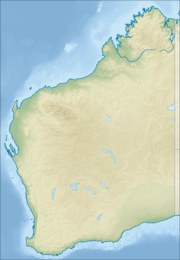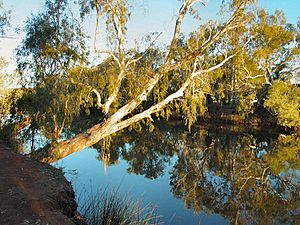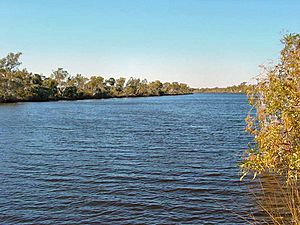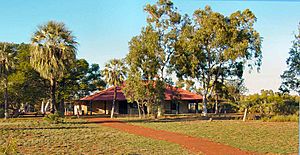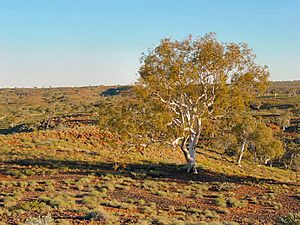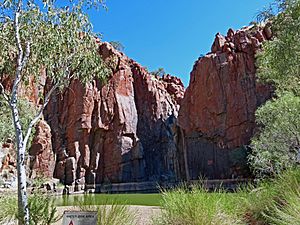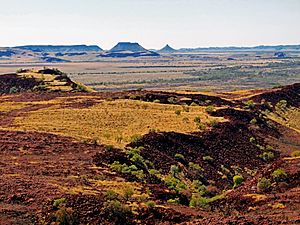Millstream Chichester National Park facts for kids
Quick facts for kids Millstream Chichester National ParkWestern Australia |
|
|---|---|
|
IUCN Category II (National Park)
|
|
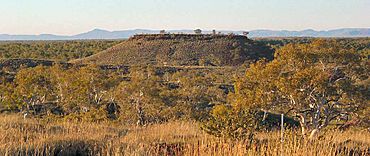
Looking toward the Chichester Range
|
|
| Nearest town or city | Roebourne |
| Established | 1970 |
| Area | 2,381.67 km2 (919.6 sq mi) |
| Managing authorities | Department of Parks and Wildlife |
| Website | Millstream Chichester National Park |
| See also | List of protected areas of Western Australia |
Millstream Chichester National Park is a special place in the Pilbara area of Western Australia. It is about 1,190 kilometres (740 miles) north of Perth, the state capital.
The park includes the old Millstream Station. This station is located on Millstream Creek, which flows into the Fortescue River. This river is one of the few places in the area with water all year round. The park also covers the beautiful Chichester Range.
Contents
Park History
The land where the park is located has been the home of the Yinjibarndi people for thousands of years. They are the traditional owners of this country.
In 1861, an explorer named Francis Thomas Gregory saw the Millstream Creek. He thought the land would be good for grazing animals. The first farming lease was started here in 1865.
The main building, called Millstream Homestead, was built in 1920. For a while, between 1975 and 1986, it was a place where people could stay and eat.
The Chichester Range National Park was first created in 1970. Later, in 1982, the Millstream area was added to the park. This made it much bigger and helped protect more of this important land.
Today, Yindjibarndi people work as rangers and help manage the park. The Millstream Homestead is now a Visitor Centre. It has displays about the Yinjibarndi people, the early settlers, and the park's nature.
Park Climate
The Pilbara region, where the park is, has a hot, dry climate. During summer, from October to April, temperatures can go above 40 degrees Celsius (104 degrees Fahrenheit). Sometimes, big storms called cyclones or local thunderstorms can cause floods, making roads and rivers overflow.
The cooler season is from May to August. There is not much rain then, and daytime temperatures are around 26 degrees Celsius (79 degrees Fahrenheit). Nights can be cool, so you might need warm clothes.
Camping in the Park
You can camp at two main campgrounds: Miliyanha and Stargazers.
- Miliyanha has a camp kitchen and toilets. You can use generators here. It also has some shade in the mornings and afternoons.
- Stargazers is more open, and generators are not allowed. It has a gas BBQ and toilets.
Both campgrounds are good for tents, caravans, and motorhomes. You can usually reach them with a two-wheel drive car when the weather is good. You can check road conditions with the Shire of Ashburton.
Some other campgrounds, like Snake Creek and Crossing Pool, are currently closed for safety reasons.
Indigenous Culture and Heritage
Yindjibarndi People's Connection
The Millstream Chichester area is very important to Indigenous culture in northern Australia. It has been important for thousands of years. The Yindjibarndi people believe Millstream is home to a mythical serpent, or 'warlu'. Its spirit is still strongly felt at Nhanggangunha, which is also known as Deep Reach Pool. All the waterholes in the park are special and should be treated with great respect because of their spiritual meaning.
The land along the Fortescue River (called Yarnda Nyirranha) is the homeland of the Yindjibarndi people. This area stretches from the Hamersley Range to the Chichester escarpment. The Ngarluma people's land is north of the Chichester escarpment, going towards the sea.
Millstream was also an important meeting place for different Aboriginal groups. The Fortescue River provided food and water, especially when it was dry. People living along the river ate many different foods. These included red meat, fish, reptiles, grubs, eggs, honey, fruits, and root vegetables. They also used fire to create open areas, which helped attract kangaroos for hunting. Knowing where waterholes were was very important because of the dry climate. The Indigenous people (Ngardangarli) were skilled at looking after their land and moved around within their traditional areas.
Today, Yindjibarndi and Ngarluma people still visit the park to spend time on their country and do traditional activities. They are also part of the Jirndawurrunhs Park Council. This council works with the Department of Parks and Wildlife to guide how the park is managed.
 | Selma Burke |
 | Pauline Powell Burns |
 | Frederick J. Brown |
 | Robert Blackburn |


